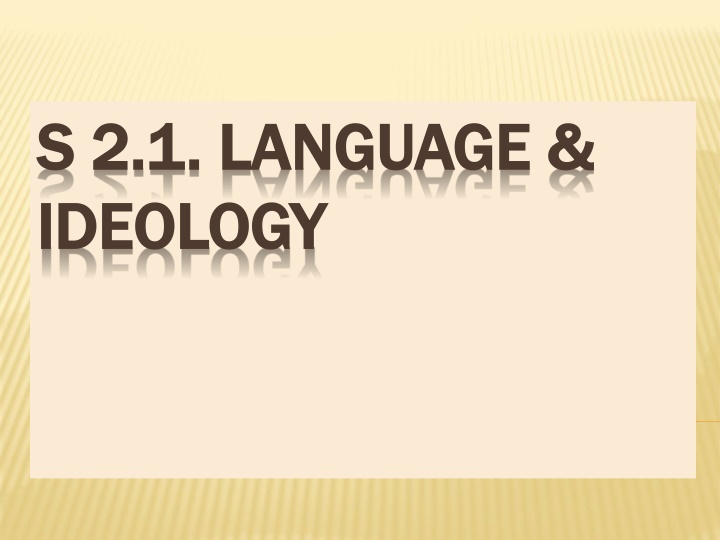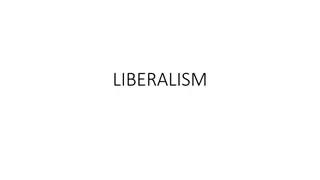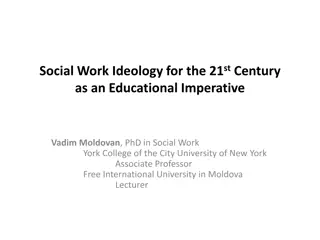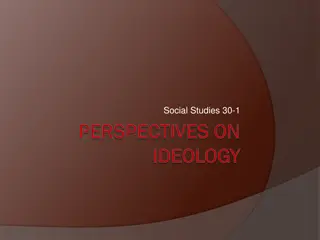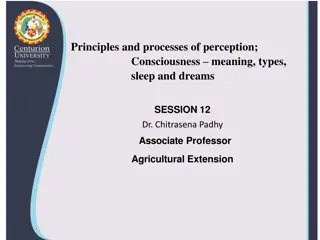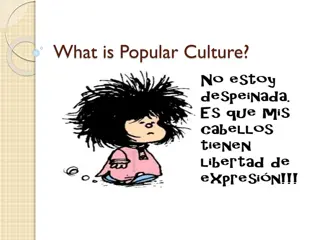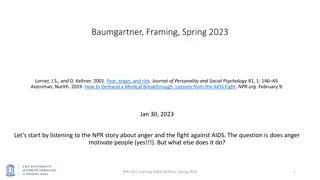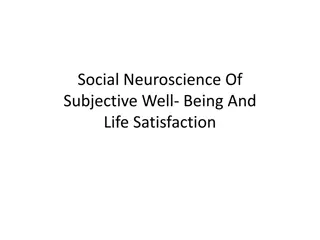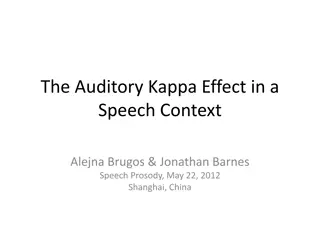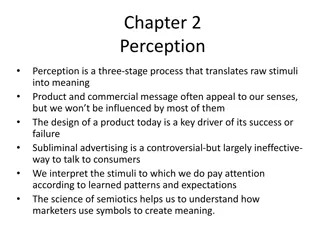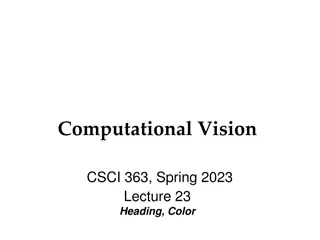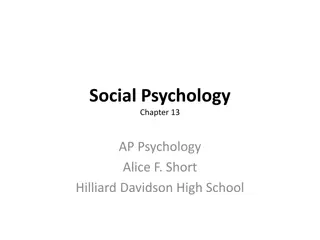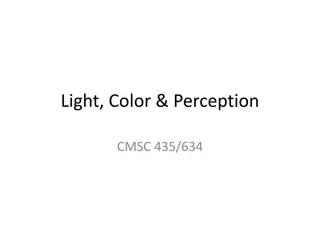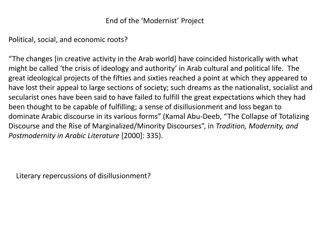Ideology: Social Perception and Influence
Ideology, as a concept, is defined by how individuals perceive and interact with their immediate social environment. Over the years, the meaning and usage of ideology have evolved, indicating social subjects' ability to recognize biases and cultural complexities. Explore the significance of ideology in societal thinking and behavior with insights from philosophers like Destutt and perspectives from Eagleton and Kress.
Download Presentation

Please find below an Image/Link to download the presentation.
The content on the website is provided AS IS for your information and personal use only. It may not be sold, licensed, or shared on other websites without obtaining consent from the author.If you encounter any issues during the download, it is possible that the publisher has removed the file from their server.
You are allowed to download the files provided on this website for personal or commercial use, subject to the condition that they are used lawfully. All files are the property of their respective owners.
The content on the website is provided AS IS for your information and personal use only. It may not be sold, licensed, or shared on other websites without obtaining consent from the author.
E N D
Presentation Transcript
S 2.1 S 2.1. LANGUAGE & . LANGUAGE & IDEOLOGY IDEOLOGY
What What is is ideology ideology? ? Ideology Ideology is is a a problematic not any any more more a a pejorative nor nor to to dismiss dismiss. . It It simply simply means social social subjects subjects to to perceive their their immediate immediate social commonsense commonsense of of the problematic concept pejorative term term to to despise concept; ; but despise but not means a a perspective perspective for perceive and and interact social environment environment. . It It is is the the social social subjects subjects. . for interact with with the
The The word word 'ideology' rationalist rationalist philosopher philosopher Destutt describe describe the the metaphysics metaphysics. . He He thought would would enable enable people people to to recognize biases biases. . Over Over the the years plethora plethora of of changes changes in in meaning 'ideology' was was first Destutt de of of that ideology, ideology, as recognize their years of of its its use, meaning. . first coined coined by de Tracy Tracy in in the ideas' ideas' by the the 1790 1790s s to to opposed opposed as a a discipline, discipline, their prejudices prejudices and use, it it has has undergone undergone a a the French French 'science 'science thought that as as to to and For For Bourdieu Bourdieu ideology so used, used, over over used more more. . ideology is is a a concept used and and abused abused that concept which that it it does does not which has not work has been been work any so any
For For Kavanagh Kavanagh ( (1998 that embodies embodies all the the cultural cultural complexity complexity of of language 1998) ) ideology ideology is is a a term the problems problems associated associated with language. . term with that all the Kress Kress ( (1985 the the less less and sociological sociological discussions meanings of of which which range simple simple system system of of ideas ideas or or world more more contested contested ones ones such false false\ \consciousness consciousness. . 1985 ) ) says settled settled that ideology ideology is is categories categories discussions - - the from the the relatively world view view to to the such as as Marx's Marx's phrase says that one one philosophical philosophical and meanings of of of of the range from relatively the phrase
According to Eagleton (1991):An ideology comprises the ways of thinking and behaving within a given society, which make the ways of that society seem natural or unquestioned to its members. What Eagleton is saying with this proposition is very important to grasp the notion of ideology and the ways it differs from other ideas available in a social milieu. He is implying that all ideas and beliefs do not qualify as ideologies, because if every point of view has an ideological character, ideology, as a critical tool has little to offer.
An ideology must be seen, first of all, as a coherent and recognizable set of ideologies have material existence in concrete cultural practices and that consciousness is shaped by ideology in these practices. This notion of ideology has enormous influence on critical and cultural studies today.
We We should should also "ideologies are than speculative speculative theoretical has has stressed stressed that conditions conditions of of ideological ideological \ \ domination also be action oriented oriented sets theoretical systems" that 'everyday 'everyday action domination''. . be able able to to see see with sets of of beliefs systems". . Just Just so action reproduces reproduces the with Eagleton Eagleton beliefs rather so Bourdieu Bourdieu that that "ideologies than are action rather the Ideologies Ideologies appear rituals rituals of of specific specific ( ( Ideological or or social social institutions institutions or or organizations Ideologies Ideologies are are accomplished accomplished in in and repetitious repetitious actions actions of of every appear in in practices Ideological State organizations of of our practices situated State Apparatuses) Apparatuses) ISAs our civil and through every day day life life of of these these institutions situated within within the the ISAs civil society society. . through the institutions. . the
reflect reflect simultaneously simultaneously deeper in in daily rehearsal of of such themselves themselves become become entrenched entrenched and and more more thoroughly These These activities activities while while social social rooting rooting practice. . habits, the more more legitimized. . our our commitments commitments these these With With each each new habits habits commitments commitments deeper new rehearsal daily practice such habits, the solidly solidly thoroughly legitimized
Ideology Ideology defined defined Althusser (1971) defines ideology in the following way while deliberating on state power and state control. He makes a useful distinction between the two. State power is maintained by what he terms repressive structures like the law courts, police, army and prisons that operate by external force. But the power of the state is maintained and legitimized more subtly, by seeming to secure the internal consent of the citizens, using what he calls ideological structures or ideological state apparatuses (ISAs). For Althusser: Ideology is systems of representation composed of concepts, ideas, myths, or images - in which men and women live their imaginary relations to the real conditions of existence.
What does Althusser mean by this? He means that ideas are 'systems 'systems of of representation' representation' and hence are signifying practices whose material existence is available in semiotic or linguistic forms. They are the systems of meaning through which we represent the world to ourselves and to one another. 'Systems' of representation are not singular; therefore there are ideologies such as feminist, Marxist, liberal, capitalist, imperialist, patriarchal, consumer, and corporate ideologies. It is in this sense that ideologies have material character and are 'practised'.
It It follows follows that interpret interpret the the same real real world world correspondence correspondence between relation relation or or practice practice and which which it it can can be be represented that ideology ideology can same so so- -called called objective differently differently. . between the and the the number represented. . can always always define objective condition condition in in the There There is is no no the conditions conditions of of a a social number of of different different ways define or or the necessary necessary social ways in in The The different different semiotic and women women are adverts adverts has has no no direct living living. . semiotic means are represented represented in in the direct relation relation to to their means through through which the contemporary contemporary their actual actual condition which men men and condition of of
What What are are ISAs ISAs? ? Althusser the argues quo that of the state maintains asymmetrical power relations with two kinds of apparatuses/channels. As noted above, he terms them: the Repressive State Apparatuses (RSAs) and the Ideological State Apparatuses (lSAs). The main social functions of the ISAs are to persistently reproduce the structured social inequality, or more specifically the same 'relations of production as well as reproduction'. status its apparent
The ISAs are those organs of civil society, which relentlessly manufacture the official version of the real conditions. The definition of Ideology discussed above is related to these institutions. It is precisely in these institutions that ideology is seen as a lived, material practice which patterns of behavior, ways of thinking, acting and consuming. include rituals, customs, The ISAs are such groupings as political parties, classrooms, textbooks, media, market, religion, family, clubs and other cultural artifacts that foster a set of ideas, beliefs, behaviours and attitudes that are sympathetic to the aims of the state and the political status quo.
The The ISAs society society the existence existence and ruling class class. . They for the the transmission transmission of of 'rules ISAs perform perform these in in official official and the the power They are are crucially crucially important 'rules of of conduct' these functions functions by discourse discourse. . power or or behavior behavior of of important channels conduct' in in society by bathing bathing legitimize legitimize the the the ruling for the the They They channels society. . As As the values, they power power. . They They make us us act act and and consume ideologies ideologies. . the guardians guardians of of a a culture's and values, they play make us consume in in accordance culture's dominant dominant norms play a a pivotal pivotal part part in in all us see, see, make make us us perceive perceive and accordance with norms forms of of and make make the ruler's ruler's and all forms with the
Subject Subject or or subjectivity subjectivity Althusser (1971) demonstrates that ideology exists by virtue of the constituting category of the 'subject'. He insists, "all ideology functions through the category of the subject, and it is in and for ideology that subjects exist". Caution is necessary to understand this concept of subject or subjectivity. Althusser's grammatical category but not a lived historical individual. Stuart Hall explains, "It is the category, the position where the subject - the I of ideological statement - constituted. sense of 'subject' is a Ideological discourses themselves constitute us as subjects for discourse" (1996). This means to say that all ideologies have the function of 'constructing' concrete individuals as 'subjects'.
How How does explains explains the the the concept concept of of 'interpellation does it it work? the constitution constitution of of subjectivity 'interpellation'. work? Althusser Althusser himself subjectivity through himself through
Interpellation Interpellation Interpellation Interpellation means some some one one. . Ideological acts acts of of interpellation interpellation or or hailing analogy analogy of of a a police 'Hey 'Hey. . You You there!' there!' When around around in in response, response, recognizing being being spoken spoken to, to, he has has adopted adopted the addressee) addressee) of of the the police means addressing addressing or or hailing Ideological subjects subjects are hailing. . Althusser police officer officer hailing hailing an When the the individual individual hailed recognizing that he or or she she has has been the proposed proposed subject subject position police discourse discourse. . hailing are produced produced by Althusser uses an individual individual: : hailed turns that it it is is him been interpellated interpellated, , position ( ( by the uses the turns her him l l her In In this this way who who are are thus thought thought and that that institution institution. . way ideology ideology is is the thus subjected subjected to to I I " " the and modes modes of of behaviours the creation creation of of subjects the patterns behaviours embedded embedded in in subjects patterns of of
According to Therborn (1980) 'powers that be' use three basic methods of talking to or addressing the human subject: 1. Human subjects are told Human subjects are told what exists: who we are, what the world is like, what are, what the world is like, what our society is like, how men and women behave like, how men and women behave - - and also by implication what implication what does does not not exist 2. They They are are told told what what is is good good: : what is is attractive, attractive, and and by by implication implication their what exists: who we our society is and also by exist. what is is right, their opposites right, what opposites. what
3. They They are certain certain ways may may want want to to see ruling ruling power's power's agenda are told ways of of ~ ~ehaving see in in society, agenda. . told what what is is possible ehaving, , certain society, are possible: : this certain changes are excluded excluded from this suggests suggests that changes that that we the that we from the The concepts of subjectivity and interpellation are very critical to understand the ways in which ideologies are encoded in discourses in general and the discourse of advertising in particular. Adverts Adverts use use all all the the interpellations interpellations. . They They \ \ speak speak of of the exist exist in in the the market, market, the the benefits can can accrue accrue to to - -, , the the consumer consumer subject implication implication also also the the practices practices which possible possible in in the the discourse discourse. methods methods the goods goods which benefits that that the subject and which are three three of of which goods and by are not the goods by not
Thank Thank you you
